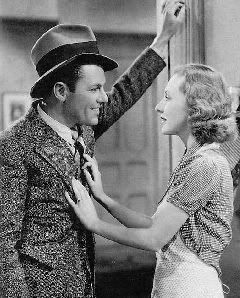I sat down to watch The Man Who Shot Liberty Valance last night on TCM, and had forgotten that one of the great character actors, with a distinctive voice, was in it. No, not Andy Devine, but Hollywood's #1 Scandinavian character actor, John Qualen. Qualen appeared in well over a hundred movies, including such famous movies as Casablanca (although, to be honest, I don't remember actually seeing Qualen in it); The High and the Mighty (as the fisherman taking his first flight); and A Patch of Blue (the man who gives blind Elizabeth Hartmann her beads). However, I'd like to talk about a lesser-known movie in which Qualen has a more prominent part: Our Daily Bread. Tom Keene stars in this 1934 movie as John Sims, a man who's down on his luck during the Great Depression and is about to be evicted from his apartment with his wife, Mary (played by Karen Morley). However, her uncle stops by for dinner, and has the deed to a non-performing plot of land; the uncle says they're more than welcome to live off the land if they can make a go of it. Having nothing better to do, they head off for the country to live as farmers. Of course, they're city folks at heart, and don't really know how to run a farm, but providence strikes when Scandinavian farmer Chris Larsen (that's Qualen), heading west because his own farm has failed, passes the Sims' farm. John invites Chris to stay with them if Chris and his family will teach him about farming.
Tom Keene stars in this 1934 movie as John Sims, a man who's down on his luck during the Great Depression and is about to be evicted from his apartment with his wife, Mary (played by Karen Morley). However, her uncle stops by for dinner, and has the deed to a non-performing plot of land; the uncle says they're more than welcome to live off the land if they can make a go of it. Having nothing better to do, they head off for the country to live as farmers. Of course, they're city folks at heart, and don't really know how to run a farm, but providence strikes when Scandinavian farmer Chris Larsen (that's Qualen), heading west because his own farm has failed, passes the Sims' farm. John invites Chris to stay with them if Chris and his family will teach him about farming.
Eventually, John decides he needs more help than just Chris Larsen, and sets up signs looking for other tradesmen. This being the Great Depression, there are millions of such tradesmen looking for work, and soon, Sims has enough people at his farm to turn the place into a commune. Still, life isn't exactly easy: there's the possibility that they might lose the land; a drought; and even a tacked on romantic conflict, involving Keene and a very young Barbara Pepper. The climax comes as, in order to beat the drought, the men try to build an irrigation canal from a nearby river to their crops.
King Vidor, who was no stranger to socially daring movies (he had directed the all-Black musical Hallelujah in 1929), directed Our Daily Bread, which, as the title card says, is "inspired by headlines of today". There's some propaganda in it, to be certain. I personally think it paints a too-rosy view of what life would have been like, as such communes are inherently unsustainable -- look at how the Israeli kibbutzim have had to modify themselves in order to keep going. Also, there's a scene in which the members band together in order to bully a businessman from buying "their" land in a foreclosure sale, in which we're pretty much being asked to root for mob rule (with its accompanying violence). But Our Daily Bread is nowhere near as propagandistic as the Socialst Realism movies from the USSR, such as Earth. And it's even less propagandizing than the end of William Wellman's Heroes for Sale (sadly, not available on DVD), in which the main character engages in direct shilling for Franklin Roosevelt's New Deal. Our Daily Bread is available on DVD, and despite its historical curiosity, is an excellent film in its own right.
Paul Muni
10 hours ago

No comments:
Post a Comment